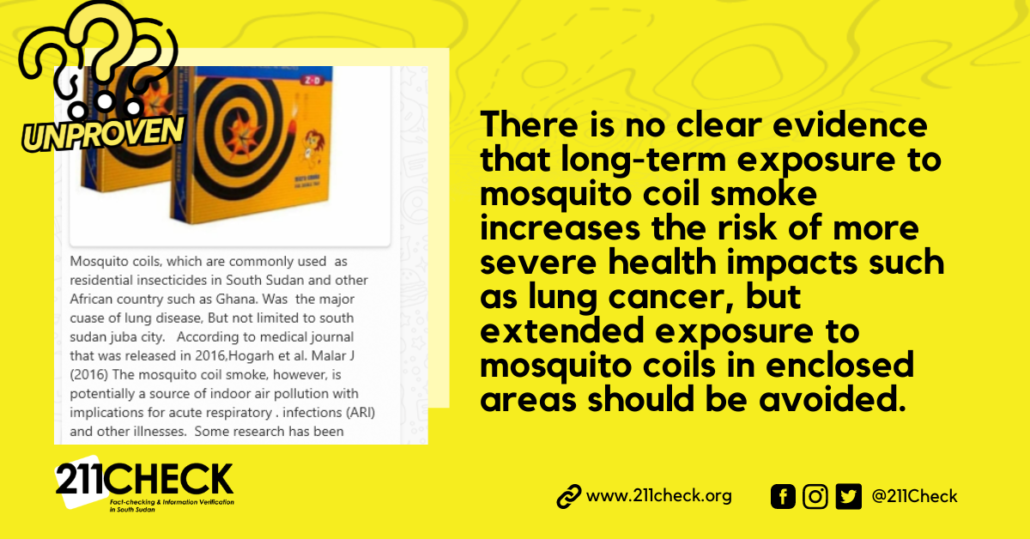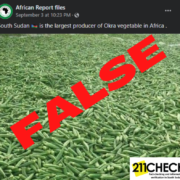Debunking the Mosquito Coil Lung Disease Myth in South Sudan and Ghana (2016)
There is no clear evidence that long-term exposure to mosquito coil smoke increases the risk of more severe health impacts such as lung cancer, but extended exposure to mosquito coils in enclosed areas should be avoided.
Writer: Jibi Moses
A message claiming that mosquito coils are the common cause of lung cancer in South Sudan and Ghana, making the rounds in WhatsApp groups and private chats, is not supported by substantial evidence.
The message quotes a Medical Journal published in 2016 by Hogarth et al.—Malar, which says that mosquito coil smoke is a potential source of indoor infections and other diseases but did not mention lung cancer. The message, which has pictures of the Zenden brand of Mosquito coil, primarily talks about the dangers of the coil and how it is the leading cause of lung diseases in South Sudan and Ghana.
“Mosquito coils, commonly used as residential insecticides in South Sudan and other African Countries such as Ghana, were the major cause of Lung disease…,” partly reads the message.
The viral message further claims other studies done in Asia show that the insecticide has different chemicals, including chloromethyl, which, the article says, is a highly potent lung carcinogen that can be produced by thermolytic degradation. The content, however, does not have an author or a clear origin.
What do we know?
The author quotes the study in his or her article Malaria Journal by Jonathan Hogarth, published on February 4, 2016, in Ghana, under the heading Application of Mosquito Repellents, Coils, and Associating Health Issues in Ghana. The report was the final work of research to determine the effectiveness of mosquito coils and repellents and their associated impact.
The research found that the insecticides were ineffective and posed a health danger but did not explicitly state that it is the cause of lung cancer in South Sudan and Ghana.
A report published by the National Library of Medicine in 2015 by JIE Zhang and others titled Mosquito coil exposure associated with small cell lung cancer: A report of three cases. A research report carried out in Asia on cancer patients was carried out on a few individuals who previously worked with a mosquito coil-producing company. The information admits insecticides have chloromethyl, a highly potent lung carcinogen. However, the report says the significance of exposure is uncertain.
“Mosquito coils, commonly used as residential insecticides in Asia, contain different concentrations of octachlorodipropyl ether (S-2) as a synergist or an active ingredient. As bis(chloromethyl) ether (BCME) is an extremely potent lung carcinogen that can be produced by the thermolytic degradation of S-2, contact with mosquito coils is likely to expose individuals to a certain level of BCME and therefore increase the risk of lung cancer. However, the significance of exposure is uncertain as clinical and epidemiological studies concerning mosquito coil users and workers are lacking….”
The report concludes that contact with mosquito coils will likely expose individuals to a level of S-2 that may increase the risk of SCLC but does not concretely say mosquito coils cause cancer.
What is lung cancer disease?
Penn Medicine defines lung cancer disease as any lung problem that prevents the lungs from working properly. World Health Organisation says The significant risk factors for chronic respiratory diseases include tobacco smoke and other indoor air pollution, allergens, household chemicals, and outdoor pollution. Some leading causes of lung diseases are explained here.
Conclusion:
211 Check finds the claim that mosquito coil is the leading cause of lung diseases unproven. Though the insecticide has some chloromethyl content, the World Health Organisation says tobacco is the leading cause of lung diseases.
In the face of this uncertainty, the essential lesson should be to avoid extended exposure to mosquito coils, particularly in enclosed areas, The Conversation says.
To ensure accuracy and transparency, we at 211 Check welcome corrections from our readers. If you spot an error in this article, please request a correction using this form. Our team will review your request and make the necessary corrections immediately, if any.
It is crucial to fight against misinformation and disinformation in mainstream and alternative media by avoiding becoming a victim of fake news. To prevent the spread of false information, you must refrain from sharing content you are unsure about or unaware of its origin. Disinformation and misinformation can be incredibly dangerous because they can mislead people and cause harm. For instance, false information on health matters can lead to wrong decisions that can put people’s lives at risk. Therefore, it’s vital to fact-check information before sharing it to promote accurate and reliable information. Visit https://211check.org/ for more details on our fact-checking process, or send us a WhatsApp message at +211 917 298 255 if you want to present a claim. Our team will promptly respond to your request because we believe #FactsMatter.









Leave a Reply
Want to join the discussion?Feel free to contribute!